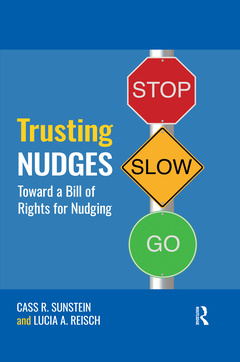Description
Trusting Nudges
Toward A Bill of Rights for Nudging
Routledge Advances in Behavioural Economics and Finance Series
Authors: Sunstein Cass R., Reisch Lucia A.
Language: English
Subjects for Trusting Nudges:
Keywords
OLS Regression; Behavioural Insights Team; World Values Survey Data Set; Cass Sunstein; Validated Measurement Items; Nudge Unit; Green Energy; Richard Thaler; Supplemental Nutrition Assistance Programs; behaviorally informed policy; Public Engagement; behavioural economics; Careless Respondents; behavioural public policy; Chinese Communist Party; choice; Official Error; nudge; Meat Free Day; Data Set; Subliminal Advertising; Automatic Voter Registration; People’s Utility Functions; Average Approval Rate; Animal Welfare Society; Percent Approval; Behavioral Biases; Automatic Enrollment; Default Rules; Nation’s Labor Laws
28.95 €
In Print (Delivery period: 14 days).
Add to cartPublication date: 12-2019
· 15.6x23.4 cm · Paperback
166.30 €
In Print (Delivery period: 14 days).
Add to cartPublication date: 01-2019
· 15.6x23.4 cm · Hardback
Description
/li>Contents
/li>Readership
/li>Biography
/li>
Many "nudges" aim to make life simpler, safer, or easier for people to navigate, but what do members of the public really think about these policies? Drawing on surveys from numerous nations around the world, Sunstein and Reisch explore whether citizens approve of nudge policies. Their most important finding is simple and striking. In diverse countries, both democratic and nondemocratic, strong majorities approve of nudges designed to promote health, safety, and environmental protection?and their approval cuts across political divisions.
In recent years, many governments have implemented behaviorally informed policies, focusing on nudges?understood as interventions that preserve freedom of choice, but that also steer people in certain directions. In some circles, nudges have become controversial, with questions raised about whether they amount to forms of manipulation. This fascinating book carefully considers these criticisms and answers important questions. What do citizens actually think about behaviorally informed policies? Do citizens have identifiable principles in mind when they approve or disapprove of the policies? Do citizens of different nations agree with each other?
From the answers to these questions, the authors identify six principles of legitimacy?a "bill of rights" for nudging that build on strong public support for nudging policies around the world, while also recognizing what citizens disapprove of. Their bill of rights is designed to capture citizens? central concerns, reflecting widespread commitments to freedom and welfare that transcend national boundaries.
Preface. 1. Why Public Opinion Matters. 2. The United States, 1: Evidence. 3. The United States, 2: Principles. 4. Europe. 5. A Global Consensus? Not Quite. 6. Trusting Nudges. 7. Educative Nudges and Noneducative Nudges. 8. Misconceptions. 9. A Bill of Rights for Nudging. Acknowledgments
Cass R. Sunstein is the Robert Walmsley University Professor at Harvard, USA. From 2009 to 2012, he was Administrator of the White House Office of Information and Regulatory Affairs. He is the founder and director of the Program on Behavioral Economics and Public Policy at Harvard Law School.
Lucia A. Reisch is a behavioral economist and Professor at Copenhagen Business School, Denmark. She also holds a permanent Guest Professorship at the Zeppelin University of Friedrichshafen, Germany, and an appointment as honorary Leibniz Chair, awarded by the German Leibniz Association and the Leibniz Institute of Prevention Research and Epidemiology.




